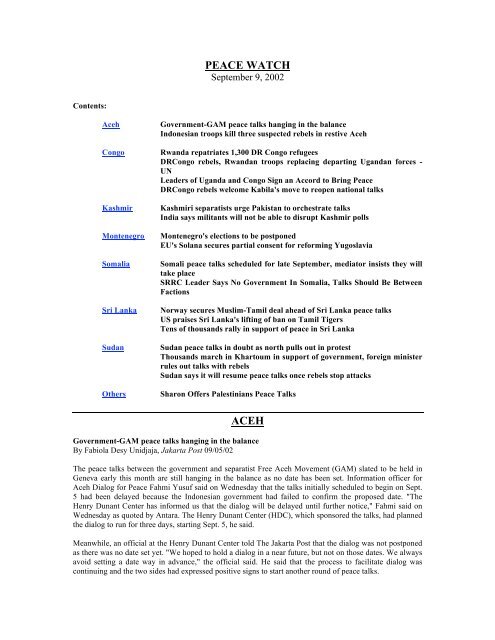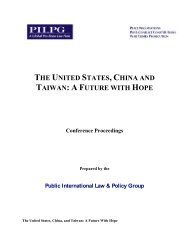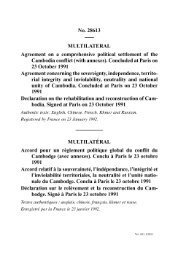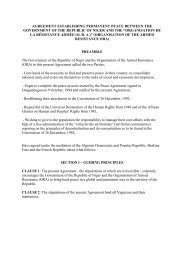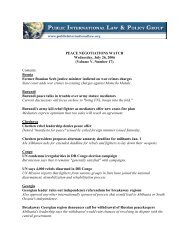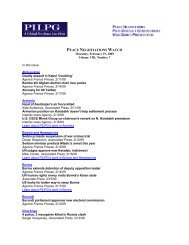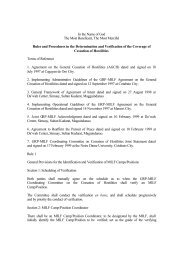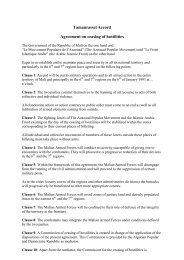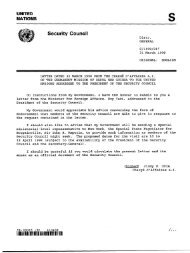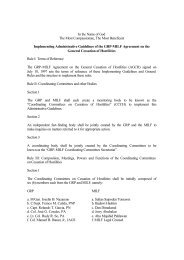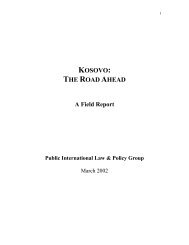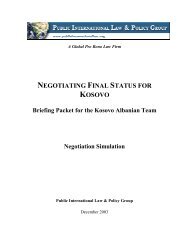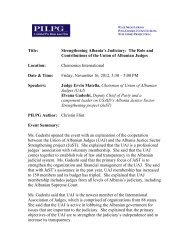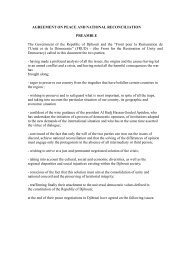PEACE WATCH ACEH - Public International Law & Policy Group
PEACE WATCH ACEH - Public International Law & Policy Group
PEACE WATCH ACEH - Public International Law & Policy Group
You also want an ePaper? Increase the reach of your titles
YUMPU automatically turns print PDFs into web optimized ePapers that Google loves.
Contents:<br />
<strong>PEACE</strong> <strong>WATCH</strong><br />
September 9, 2002<br />
Aceh Government-GAM peace talks hanging in the balance<br />
Indonesian troops kill three suspected rebels in restive Aceh<br />
Congo Rwanda repatriates 1,300 DR Congo refugees<br />
DRCongo rebels, Rwandan troops replacing departing Ugandan forces -<br />
UN<br />
Leaders of Uganda and Congo Sign an Accord to Bring Peace<br />
DRCongo rebels welcome Kabila's move to reopen national talks<br />
Kashmir Kashmiri separatists urge Pakistan to orchestrate talks<br />
India says militants will not be able to disrupt Kashmir polls<br />
Montenegro Montenegro's elections to be postponed<br />
EU's Solana secures partial consent for reforming Yugoslavia<br />
Somalia Somali peace talks scheduled for late September, mediator insists they will<br />
take place<br />
SRRC Leader Says No Government In Somalia, Talks Should Be Between<br />
Factions<br />
Sri Lanka Norway secures Muslim-Tamil deal ahead of Sri Lanka peace talks<br />
US praises Sri Lanka's lifting of ban on Tamil Tigers<br />
Tens of thousands rally in support of peace in Sri Lanka<br />
Sudan Sudan peace talks in doubt as north pulls out in protest<br />
Thousands march in Khartoum in support of government, foreign minister<br />
rules out talks with rebels<br />
Sudan says it will resume peace talks once rebels stop attacks<br />
Others Sharon Offers Palestinians Peace Talks<br />
<strong>ACEH</strong><br />
Government-GAM peace talks hanging in the balance<br />
By Fabiola Desy Unidjaja, Jakarta Post 09/05/02<br />
The peace talks between the government and separatist Free Aceh Movement (GAM) slated to be held in<br />
Geneva early this month are still hanging in the balance as no date has been set. Information officer for<br />
Aceh Dialog for Peace Fahmi Yusuf said on Wednesday that the talks initially scheduled to begin on Sept.<br />
5 had been delayed because the Indonesian government had failed to confirm the proposed date. "The<br />
Henry Dunant Center has informed us that the dialog will be delayed until further notice," Fahmi said on<br />
Wednesday as quoted by Antara. The Henry Dunant Center (HDC), which sponsored the talks, had planned<br />
the dialog to run for three days, starting Sept. 5, he said.<br />
Meanwhile, an official at the Henry Dunant Center told The Jakarta Post that the dialog was not postponed<br />
as there was no date set yet. "We hoped to hold a dialog in a near future, but not on those dates. We always<br />
avoid setting a date way in advance," the official said. He said that the process to facilitate dialog was<br />
continuing and the two sides had expressed positive signs to start another round of peace talks.
Peace Watch 1<br />
09/09/02<br />
Separately, government officials said that the government had actually confirmed its participation in the<br />
peace talks. Coordinating Minister for Political and Security Affairs Susilo Bambang Yudhoyono left<br />
Indonesia for Europe on Tuesday, and planned to go to the HDC office. Indonesian chief negotiator for<br />
Aceh Wiryono Sastrohandoyo was also in Europe, his relatives said on Wednesday.<br />
Aceh Legal Aid Foundation (LBH) director Rufriadi said that Jakarta should immediately decide whether<br />
or not to join the dialog because the three international wise men were only available up until Sept. 12 to<br />
facilitate the dialog. He was referring to Gen. Anthony Zinni from the United States, Surin Vitsuan from<br />
Thailand and Bonimir Lancar from Yugoslavia, who were present in the last dialog in May. "If there is no<br />
signal from Jakarta of its intent to continue the dialog before Sept. 12, then there will be no follow up talks<br />
at all," Rufriadi said.<br />
The government has been vacillating regarding with this planned peace talks. Initially, it said it would<br />
attend the dialog only if GAM accepted the special autonomy package. Then, later, the government<br />
changed its mind and decided to attend the talk, saying that having another dialog with GAM could be<br />
useful. In the recent interview with The Jakarta Post, Wiryono said the government aimed to reach another<br />
agreement with GAM to cease hostilities, a precondition to hold the planned all-inclusive dialog for Aceh.<br />
Indonesian troops kill three suspected rebels in restive Aceh<br />
Agence France Presse 09/08/02<br />
Indonesian troops shot dead three suspected separatist rebels in the latest violence to hit the restive<br />
province of Aceh, the military said on Sunday. Troops shot dead two men, suspected to be rebels from the<br />
separatist Free Aceh Movement (GAM) during an armed clash in Teunom, in the West Aceh district on<br />
Saturday, Aceh Military Spokesman Major Zaenal Muttaqin said. Two hand guns were seized from the<br />
victims, he added.<br />
Indonesian soldiers also shot dead another man in Cot Tunong, in the district of Bireun on Saturday,<br />
Muttaqin said. "The victim had been arrested but tried to escape so that he was finally shot," Muttaqin said,<br />
adding that the victim was suspected to be a rebel as a hand gun and bullets where found on him when he<br />
was arrested.<br />
GAM rebels also attacked a base of the elite army Kopassus unit in Jeunib, also in Bireun district on<br />
Saturday but there were no casualty on both sides, the base commander, First Lieutenant Andi said. The<br />
local GAM commander, Darwis Djeunieb, claimed responsibility over the attack and said that several<br />
soldiers had been killed or injured in the attack.<br />
The GAM has been fighting since 1976 for independence in the resource-rich province at the tip of Sumatra<br />
island. More than 10,000 people are estimated to have been killed since GAM began its fight. The<br />
government and the rebels have said they would this month attend peace talks in Geneva organised by<br />
mediators from the Henry Dunant Centre. A legal aid agency said Thursday that almost 1,000 civilians died<br />
in the conflict between GAM and government forces in the first eight months of this year.<br />
Rwanda repatriates 1,300 DR Congo refugees<br />
Agence France Presse 09/03/02<br />
CONGO<br />
Rwandan authorities have repatriated at least 1,300 refugees to Nord-Kivu Province in the neighbouring<br />
Democratic Republic of Congo over the last three days, officials said Tuesday. In coming weeks, an<br />
Organising Committee for the Repatriation of Congolese Refugees in Rwanda plans to help 31,500 people<br />
return to their homes, the committee announced.
Peace Watch 1<br />
09/09/02<br />
Almost all the refugees are ethnic Tutsis who come from the Masisi region of Nord-Kivu Province, across<br />
the border from Rwanda, which has a minority Tutsi population. They fled in 1994 and 1995 to escape<br />
persecution at the hands of extremist militias and former government troops from Rwanda's Hutu majority,<br />
held responsible for the 1994 genocide of some 800,000 Tutsis and politically moderate Hutus. The<br />
refugees have been living since 1995 in camps at Byumba in northern Rwanda and Kibuye in the west, the<br />
committee stated.<br />
The Hutu militias fled across the border into the then Zaire after the mainly Tutsi Rwandan Patriotic Front<br />
(RPF) put an end to three months of genocide in July 1994 and seized power in Kigali.<br />
DRCongo rebels, Rwandan troops replacing departing Ugandan forces – UN<br />
BBC Monitoring Africa – Political 09/06/02<br />
Text of report by UN regional information network IRIN on 5 September<br />
Kinshasa, 5 September: The UN peacekeeping mission in the DRCongo has expressed concern over recent<br />
advances made by rebel troops and the Rwandan Patriotic Army (RPA) into territory recently vacated by<br />
the Ugandan army. Addressing a news conference in the DRCongo capital Kinshasa on Wednesday 4<br />
September , UN special envoy Amos Namanga Ngongi, said he had asked Roger Lumbala, leader of the<br />
rebel Congolese Rally for Democracy-National (RCD-N) to order his troops to halt their advance towards<br />
Beni and Bunia.<br />
Both these northeastern cities were previously occupied by the Ugandan-backed Congolese Rally for<br />
Democracy-Kisangani-Liberation Movement (RCD-K-ML). Uganda, which also supports the RCD-N,<br />
recently withdrew nearly 2,000 of its soldiers from locations in the DRCongo, including Beni. The<br />
withdrawal comes in the wake of an agreement reached between DRCongo and Uganda on 15 August in<br />
Luanda, Angola. However, two Ugandan battalions are to remain in Bunia to safeguard civilian security<br />
following violent clashes there last month. According to the UN mission in the DRCongo, known as<br />
Monuc, advances by RCD-N have the objective of recovering territory lost to RCD-K-ML in March and<br />
April while the inter-Congolese dialogue was being held in Sun City, South Africa. Lumbala was the head<br />
of the RCD-K-ML's department of internal affairs before forming his RCD-N breakaway faction. "It is very<br />
disappointing to see people who have signed a peace agreement continue to wage war," said Ngongi.<br />
Ngongi confirmed recent accusations made by DRCongo Defence Minister Irung Awan that about 1,000<br />
Rwandan forces occupied the town of Kasuo, near the town of Lubero, 150 km north of Goma. "There have<br />
been RPA troop movements toward Lubero, an area under control of the Ugandan-backed RCD-K-ML," he<br />
said. "I hope that the Rwandan troops will not continue towards other locations in Ituri," he added.<br />
Rwanda has reportedly told Monuc that its army is in the throes of a counter-offensive against forces of the<br />
Interahamwe (Rwandan Hutu extremist militias) and the ex-FAR (Rwanda's former army), both heavily<br />
implicated in the 1994 genocide.<br />
Leaders of Uganda and Congo Sign an Accord to Bring Peace<br />
New York Times 09/08/02<br />
The leaders of Uganda and Congo have signed a peace accord, as four years of war wind down.<br />
President Yoweri Museveni of Uganda and his Congolese counterpart, Joseph Kabila, signed the accord<br />
late on Friday in the presidential palace in Luanda, Angola's capital. The signatures were witnessed by the<br />
Angolan president, Jose Eduardo dos Santos. Diplomats said the accord committed Uganda to withdrawing<br />
its remaining troops from the central African country of Congo, where they have been fighting alongside<br />
rebels opposed to the Kinshasa government. Congo, in turn, pledged to take action against rebels based in<br />
the east of the huge, mineral-rich country who are hostile to the Ugandan government in Kampala.
Peace Watch 1<br />
09/09/02<br />
Mr. Museveni, who shook hands with Mr. Kabila after signing the deal, said Uganda had begun to honor its<br />
commitments. "Uganda had already withdrawn most of its troops from the Congo, once the conditions<br />
which had created that problem had been resolved," he said. "Only a few battalions remained, and even<br />
those battalions are being withdrawn right now."<br />
Mr. Kabila thanked Mr. dos Santos for the military backing of Angola, which has been a mainstay of<br />
support for the Kinshasa government since the beginning of the Congolese war in 1998. Namibia and<br />
Zimbabwe have also helped Mr. Kabila. Angola has withdrawn most of its troops from Congo, and over the<br />
last year Mr. dos Santos has made diplomatic efforts toward ending the war.<br />
But Rwanda -- which has backed rebel groups fighting the Congo government -- says its soldiers are still in<br />
Congo to safeguard Rwandan security interests. President Paul Kagame and Mr. Kabila signed a pact in<br />
South Africa in July. Rwanda pledged to withdraw its forces provided that Mr. Kabila's administration<br />
helped disarm and send back militant Hutu militia blamed for the mass killings in Rwanda in 1994.<br />
DRCongo rebels welcome Kabila's move to reopen national talks<br />
Agence France Presse 09/09/02<br />
The main rebel group in the war-ravaged Democratic Republic of Congo (DRC) on Monday welcomed<br />
President Joseph Kabila's proposal to re-open national talks that broke up in April. "It is a significant step<br />
forward. We are now waiting for this proposal to turn into action," Joseph Mudumbi, an official of the<br />
Rwanda-backed Congolese Rally for Democracy (RCD), told AFP.<br />
On Saturday, Kabila told parliament that the so-called Inter-Congolese Dialogue would resume in the<br />
second half of September so as to reach an "inclusive accord." Five weeks of such talks ended in Sun City,<br />
South Africa, in April with a power-sharing deal between Kabila, former rebel leader Jean-Pierre Bemba<br />
and other political actors.<br />
The RCD, which had been offered some government posts under the arrangement, rejected the accord,<br />
whose inclusivity is widely seen as an essential condition of lasting peace in the DRC. "With this offer,<br />
Kabila is burying the Sun City deal, which the RCD always condidered to be non-existent. There is now a<br />
means to negotiate a comprehensive political agreement said Mudumbi, who spoke to AFP from the rebel<br />
movement's headquarters in Goma, eastern DRC. "If there are signs that Kinshasa is stopping its support<br />
for the negative forces, a comprehensive deal will not be long in coming," he said, alluding to Rwandan<br />
Hutu extremists whose presence in eastern DRC prompted Kigali to send forces there and back the RCD in<br />
1998.<br />
KASHMIR<br />
Kashmiri separatists urge Pakistan to orchestrate talks<br />
By PRATAP CHAKRAVARTY Agence France Press 09/09/02<br />
Indian Kashmir's top separatist leaders Monday urged Pakistan to arrange a meeting between mediators of<br />
the two countries to speed up a dialogue aimed at restoring peace in the troubled Himalayan region.<br />
Leaders from the All Parties Hurriyat Conference (APHC) met New Delhi-based diplomats from Pakistan<br />
to arrange the crucial meet, Abdul Gani Bhat, chairman of the umbrella forum of separatist groups of<br />
Indian-administered Kashmir, told AFP. "We went there and spoke to them and their response was very,<br />
very encouraging and we hope after the dust of elections in Kashmir settles down in the two countries than<br />
such a meeting can happen," Bhat said in New Delhi. Indian Kashmir is set to go to the polls in four phases<br />
beginning September 16.<br />
The APHC and an India-backed committee of mediators Saturday forged an agreement to meet a similar<br />
panel in Pakistani-controlled Kashmir to pursue talks over the region, where a Muslim separatist campaign
Peace Watch 1<br />
09/09/02<br />
has left more than 36,500 people dead since 1989. India's Kashmir Committee, headed by former <strong>Law</strong><br />
Minister Ram Jethmalani, said it would take the proposal to Prime Minister Atal Behari Vajpayee's<br />
government for approval. But Vajpayee earlier Monday said his government was not considering the<br />
APHC's demand to visit Pakistan. "There is no such proposal before us," Vajpayee told reporters shortly<br />
before leaving for a week-long visit to New York for the United Nations General Assembly session.<br />
Bhat said New Delhi, which in the past has refused permission to Hurriyat leaders to visit Pakistan, must<br />
change its attitude if it wants to restore peace in Kashmir, the subject of two of the three India-Pakistan<br />
wars since 1947. "Pakistani will cooperate with us and we have to rise above ordinary considerations and<br />
move forward to purchase purposeful peace and this can happen only if we remove the bottlenecks of the<br />
past," Bhat said. "And that would depend on the attitude the government of India adopts (on our proposal)."<br />
Pakistan on Monday said it supported the Hurriyat's demand for permission to cross the borders to<br />
Islamabad to help settle the long-running Kashmir dispute. "We certainly support the contention in the<br />
declaration of that committee that a peaceful negotiated settlement of the Kashmir issue is desirable,"<br />
Pakistani foreign office spokesman Aziz Ahmed Khan said in Islamabad. "We have always asked for that,<br />
we have always demanded that," he said.<br />
Bhat said there was no alternative to talks to resolve the dispute between the two nuclear rivals over<br />
Kashmir and added the Hurriyat and the Pakistani and Indian committees were committed to the goal of<br />
peace. "We have to put in an effort which would be a collective effort of the two committees and the APHC<br />
to usher in an era of peace and people-to-people contact with a view to resolving the dispute and also<br />
establishing the peace in region," he said. "We consider the survival of the region now depends on the<br />
restoration of peace in Kashmir."<br />
India's committee has not been able to persuade any separatist group or leader to take part in the elections.<br />
"Our efforts for the talks and the elections are separate issues," Bhat added. A section of separatists is<br />
campaigning for total independence, while others call for a UN-supervised plebicite to determine the future<br />
of Kashmiris.<br />
Armed Islamic guerrilla organisations, who are seeking the accession of Indian Kashmir to Pakistan, have<br />
threatened to disrupt next week's election.<br />
India says militants will not be able to disrupt Kashmir polls<br />
Agence France Presse 09/03/02<br />
Indian Defence Minister George Fernandes Tuesday said any attempts by Islamic militants to disrupt the<br />
upcoming Kashmir elections would be thwarted and added that voters were unlikely to heed the boycott<br />
call by separatists. "Kashmiris are steeped in politics. They are aware of the significance of the current polls<br />
and given such a situation, we expect a good turnout," Fernandes said at a ceremony at the prestigious<br />
Institute of Defence Studies and Analysis. "All the protection security forces can provide will be there for<br />
candidates, voters and officials and staff for the conduct of elections," he said. Fernandes said militants had<br />
been unable to dissuade voters from participating in local council polls last year to elect village heads<br />
despite violence.<br />
The four-phase elections to the 87-member Kashmir legislature are taking place between September 16 and<br />
October 8. Militants have already started targeting pro-India political workers, in particular activists of the<br />
ruling National Conference party. Hardline militant groups have called for a boycott of the polls which they<br />
say would not help in bringing peace to the state, where an armed insurgency since 1989 has claimed<br />
36,500 lives. Some Kashmiri militant groups are demanding the Muslim-majority state join neighbouring<br />
Pakistan while others want an independent homeland. Kashmir's main separatist alliance, the All Parties<br />
Hurriyat Conference (APHC), has decided to boycott the polls while Muslim rebels opposed to Indian rule<br />
have threatened to kill those taking part.
Peace Watch 1<br />
09/09/02<br />
MONTENEGRO<br />
Montenegro's elections to be postponed<br />
By ALEN MLATISUMA; Associated Press 09/04/02<br />
PODGORICA, Yugoslavia - Early parliamentary elections in Yugoslavia's junior republic of Montenegro,<br />
originally scheduled for Oct. 6, will be postponed 15 days due to a dispute over electoral laws, officials said<br />
Wednesday. Rival parties in Montenegro - which along with Serbia makes up Yugoslavia - will formally<br />
announce the new date after their officials meet Thursday, said Miodrag Zivkovic, the leader of the proindependence<br />
Liberal Alliance party.<br />
The delay results from a failure among Montenegro's parties to agree on key electoral laws, including the<br />
number of their representatives in electoral commissions and the number of minority ethnic Albanian<br />
deputies in the 77-seat parliament. Opposition parties have also rejected a proposal by Montenegro's<br />
President Milo Djukanovic to name Constitutional Court judges to rule on possible electoral disputes.<br />
The opposition had threatened to boycott the Oct. 6 vote if new electoral laws were not passed in the<br />
republic's parliament and if new judges were not named. The rival parties finally reached a compromise on<br />
the issues earlier this week after U.S. Ambassador to Yugoslavia, William Montgomery, mediated between<br />
the two sides. But the agreement came too late for parliament to pass the new laws by Oct. 6, said Predrag<br />
Bulatovic, the leader of the pro-Serbian Socialist Peoples' Party.<br />
Djukanovic called for early elections after his government collapsed in May. At that time, his former<br />
coalition partners - lawmakers from the pro-independence Liberal Alliance - walked out in protest over a<br />
Western-brokered deal to keep Serbia and Montenegro together in a reformed union. Fearing further<br />
secessionist unrest in the Balkans, the European Union engineered an agreement that keeps the two<br />
Yugoslav republics loosely together in a more decentralized federation to be named "Serbia and<br />
Montenegro."<br />
The new union's constitution has yet to be finalized and EU's foreign policy chief, Javier Solana, is due in<br />
Belgrade on Friday to urge opposing sides in Serbia and Montenegro to agree on the new country's charter.<br />
Montenegro's 600,000 people remain bitterly split over whether to remain in a union with Serbia or seek<br />
complete independence.<br />
EU's Solana secures partial consent for reforming Yugoslavia<br />
By MISHA SAVIC; Associated Press 09/06/02<br />
With the mediation of a top European Union envoy, leaders of Serbia and Montenegro agreed Friday on all<br />
but one point of a deal on shaping their troubled union into a looser federation. "We are close to finalizing<br />
the agreement," said the EU foreign policy chief, Javier Solana, after meeting officials of the two Yugoslav<br />
republics.<br />
The officials spent the day wrangling over how much central administration would exist in the future state<br />
that is expected to replace Yugoslavia later this year. Under a tentative, EU-brokered agreement reached in<br />
April, the two Yugoslav republics are to become virtually sovereign states, but with a common market and<br />
joint defense and foreign policies. <strong>Law</strong>makers agreed earlier this year to rename the federation "Serbia and<br />
Montenegro." "Yugoslavia" will cease to exist.<br />
Talks Friday stalled over an issue which has held up final agreement on the constitution for months now:<br />
whether deputies in the joint parliament will be drawn from the republic's own parliaments or be chosen<br />
directly by voters. "It's a pity that they have not been able to agree today on that point," Solana said while<br />
praising the officials for agreeing on a "whole set of future economic and political reforms." He also<br />
warned that negotiations on Serbia and Montenegro's membership in several EU institutions cannot begin
Peace Watch 1<br />
09/09/02<br />
until all differences are resolved. Both republics hope to join various EU groups as a step toward eventual<br />
EU membership.<br />
Serbian Prime Minister Zoran Djindjic indicated that lawmakers could change the constitution soon to<br />
include those points already agreed upon and settle how deputies will be elected later. "After the<br />
parliaments of Serbia and Montenegro, as well as the federal parliament, adopt the changes, new general<br />
elections could be held within 60 days and during that period we could agree on how to elect deputies" to a<br />
new federal assembly, Djindjic said. "What we must have is a modern state, compatible with the European<br />
Union," he added.<br />
Both Serbia and Montenegro are internally divided on whether their republics should stick together or go<br />
their separate ways. Miolo Djukanovic leads the drive for independence in Montenegro, while profederation<br />
Montenegrins demand strong ties with Serbia. And in Serbia, some government leaders have<br />
said that their republic would be better off without tiny Montenegro. Under the EU-brokered deal, each<br />
republic is allowed to hold a referendum on full independence in three years.<br />
Yugoslavia started unraveling along ethnic lines in the early 1990s. Slovenia, Croatia, Macedonia and<br />
Bosnia-Herzegovina seceded, leaving only Serbia and Montenegro together. Their union began to crumble<br />
in 1997, when Djukanovic distanced himself from former Yugoslav President Slobodan Milosevic. The<br />
Montenegrin independence drive continued even after Milosevic's ouster in 2000.<br />
SOMALIA<br />
Somali peace talks scheduled for late September, mediator insists they will take place<br />
By TOM MALITI; Associated Press 09/06/02<br />
Regional mediators in the Somali peace process are confident that a proposed reconciliation conference<br />
will take off this time, because they have assurances from all those concerned, a Kenyan government<br />
official said Friday.<br />
Foreign Minister Marsden Madoka said that a loose alliance of faction leaders opposed to Somalia's<br />
transitional government, led by President Abdiqasim Salad Hassan, will attend the talks, expected to be<br />
held by Sept. 30 in Eldoret, about 250 kilometers (155 miles) from the capital Nairobi. The Ethiopianbacked<br />
Somali Reconciliation and Restoration Council did not attend talks that were set for April and then<br />
postponed to August, putting Somalia's peace process on hold. "In the past we tended just to invite whom<br />
we thought was involved. But we've (now) gone down to the ground to consult everybody who would be an<br />
interested party," Madoka told journalists, before a meeting of regional foreign ministers and ambassadors<br />
began to discuss the Somalia National Reconciliation Conference.<br />
Somalia has not had a strong central authority since the ouster of President Mohamed Siad Barre in January<br />
1991 by armed clan-based political factions. These factions have since fought with each other, turning the<br />
Horn of Africa nation of 7 million into battling fiefdoms ruled by heavily armed militias. A transitional<br />
government was elected at a peace conference in neighboring Djibouti in August 2000 but has little<br />
influence outside of the capital Mogadishu.<br />
The U.N. Secretary-general's representative to Somalia, Winston Tubman, said in a statement Friday:<br />
"Somalis should not squander another opportunity to find peace, but should be seeking ways to reconcile<br />
among themselves before the international interest in their country dissipates."<br />
The 16-year old Intergovernmental Authority on Development, which is organizing the Somali peace talks,<br />
is made up of seven East and Horn of Africa countries, including Somalia.
Peace Watch 1<br />
09/09/02<br />
SRRC Leader Says No Government In Somalia, Talks Should Be Between Factions<br />
BBC Monitoring <strong>International</strong> Reports 09/09/02<br />
Dr Hilowle Iman Omar, one of the SRRC Somali Reconciliation and Reconstruction Council executive<br />
members, has rejected two points made by Kenyan foreign minister Marsden Madoka regarding the<br />
forthcoming Somali peace talks scheduled to be held in Kenya. "It was a slip of the tongue and there is no<br />
government in Somalia" said Mr Hilowle. He further said that the SRRC would attend the talks only if they<br />
were conducted between the Arta faction interim government of Somalia and the SRRC.<br />
Denying accusations, he said faction leaders were not to blame for the many postponements of the peace<br />
talks in the past. "It is not wise to blame the Somali factions at this time when preparations for such peace<br />
talks were under way," he said.<br />
SRI LANKA<br />
Norway secures Muslim-Tamil deal ahead of Sri Lanka peace talks<br />
Agence France Presse 09/03/02<br />
Peace broker Norway Tuesday secured a key agreement between Sri Lanka's two main minority groups<br />
ahead of crucial talks aimed at ending decades of ethnic bloodshed in the island, diplomats said. Sri Lanka's<br />
main Muslim leader Rauf Hakeem met with the Tamil rebel chief negotiator Anton Balasingham at the<br />
residence of the Norwegian ambassador to London and sorted out their differences, diplomats said.<br />
Hakeem left for London over the weekend to "clarify" his own position at the talks due to open in Thailand<br />
on September 16 between the rebel Liberation Tigers of Tamil Eelam (LTTE) and the Sri Lankan<br />
government. Earlier, there had been reports that the Tigers were against the Muslim leader who represents<br />
the second largest minority after Tamils entering talks as a representative of the Muslims.<br />
However, after two hours of talks in London, the two sides agreed that Hakeem will initially be regarded a<br />
government delegate while recognising his leadership of his Sri Lanka Muslim Congress (SLMC) party. "It<br />
was further agreed that Mr. Hakeem will participate in future rounds of talks as the leader of the Sri Lankan<br />
Muslim Congress as well as the head of a Muslim delegation representing the Muslim community," the<br />
Norwegian government said in a statement.<br />
Sri Lanka's minority Muslim community is seen as crucial to the peace process aimed at ending three<br />
decades of ethnic bloodshed that has claimed more than 60,000 lives. The role of the Muslims remained<br />
crucial given the leverage the main SLMC has with the main political parties in the country, analysts said.<br />
The government, with the support of the SLMC's 12 MPs, has a narrow two-seat majority in the 225member<br />
parliament. Any pull out of Hakeem's SLMC from the government could rock the administration<br />
and have serious implications for the peace process, officials said.<br />
Muslims are considered a distinct ethnic community in Sri Lanka in addition to their religious identity and<br />
form about seven percent of the 18.7 million population. Ethnic Tamils constitute 12.6 percent of the<br />
population and are mainly Hindus. The majority Sinhalese are mostly Buddhists.<br />
"The exact position of the Muslims at the Thai talks could be decisive for the success of the peace process<br />
given the ethnic tensions between the Tamils and Muslims in the (embattled) eastern province," an Asian<br />
diplomat said.<br />
Muslims have complained of harassment at the hands of the Tigers in eastern Sri Lanka early this year. But<br />
in April SLMC leader Hakeem entered into a pact with Tiger supremo Velupillai Prabhakaran to sort out<br />
their problems. However, Muslims argue that they continue to be targeted by Tigers in the eastern province,<br />
while police and security forces were reluctant to take action fearing it could be a breach of the Osloarranged<br />
truce between the government and the LTTE in place since February 23. The Norwegian
Peace Watch 1<br />
09/09/02<br />
government said that the SLMC and the LTTE agreed to have a "broader meeting" after the first round of<br />
peace talks in Thailand.<br />
US praises Sri Lanka's lifting of ban on Tamil Tigers<br />
Agence France Presse 09/05/02<br />
The United States on Thursday praised Sri Lanka's decision to lift a ban on Tamil Tiger rebels, which<br />
cleared the way for the start of crucial peace talks in Thailand later this month. Assistant Secretary of State<br />
for South Asian Affairs Christina Rocca said the move on Wednesday was "another very welcome step" in<br />
the Norwegian-brokered process aimed at ending the three-decades-long conflict which has claimed 60,000<br />
lives. "Recent developments in Sri Lanka have been encouraging and give rise to cautious optimism,"<br />
Rocca said at a forum sponsored by the US Institute of Peace. "The United States strongly supports the Sri<br />
Lankan peace process," Rocca said, urging both sides in the bloody conflict to continue to take constructive<br />
steps towards peace.<br />
Sri Lanka's defence minister, Tilak Marapone, rescinded the ban on the rebel Liberation Tigers of Tamil<br />
Eelam (LTTE) at midnight (1800 GMT Wednesday) to clear the way to start Norwegian-sponsored peace<br />
talks in Thailand on September 16.<br />
Deputy Secretary of State Richard Armitage, in an appearance at the same Washington forum, reflected on<br />
the terrible human waste of the Sri Lankan conflict that he witnessed in a visit to the country's Jaffna<br />
peninsula last month. "I can honestly say that I've not seen such a blessedly sad landscape in a long time,<br />
especially since my service in Vietnam," he said. "Sri Lanka is now looking forward to the best chance in a<br />
generation to reach some kind of peace settlement. I spoke of the possibility of stepped up relations with<br />
the United States. I also saw a clear reminder of just how difficult the war against terrorism can be."<br />
Armitage's visit to Sri Lanka and signal of a closer relationship with the Colombo government was seen in<br />
the region as a signal to the Tigers that they have no choice but to embrace an eventual peace settlement.<br />
Tens of thousands rally in support of peace in Sri Lanka<br />
By SHIMALI SENANAYAKE; Associated Press 09/09/02<br />
Tens of thousands of Sri Lankans converged on the streets of Colombo on Monday in support of the<br />
government's efforts to end the island nation's 19-year ethnic conflict. "This is just the beginning of a long<br />
and arduous journey toward peace. It's only if we stand together that we can put a permanent end to the<br />
bloodshed," Prime Minister Ranil Wickremesinghe said in an address. The rally was one of the biggest ever<br />
in Sri Lanka. The Liberation Tigers of Tamileelam have been fighting government forces since 1983 for an<br />
independent homeland for Sri Lanka's 3.2 million minority Tamils, arguing that they suffer discrimination<br />
at the hands of the Sinhalese majority.<br />
The conflict has killed more than 64,500 people, but the bloodshed stopped after both sides signed a<br />
Norway-brokered cease-fire agreement in February. Direct peace talks are to be held in Thailand later this<br />
month.<br />
Wickremesinghe said Sri Lanka had the backing of the international community for its peace efforts,<br />
especially after the events of Sept. 11. "We are working toward the transition of a rebel group, who have<br />
sustained themselves through fighting, to work within a democratic and political framework. This is not an<br />
easy task," Wickremesinghe said.<br />
Participants at the rally chanted slogans and carried placards calling for "peace and democracy." Tamils in<br />
the gathering performed a traditional dance dressed in colorful wraparound saris. Others carried flags. "This<br />
is the best chance we have had for peace in two decades, it is our duty to support it," said R. Rupasinghe, a<br />
59-year-old trader who had closed his shop in the southern city of Hambantota to participate in the rally.
Peace Watch 1<br />
09/09/02<br />
About 5,000 policemen were deployed on the streets of Colombo to prevent any attempts to sabotage the<br />
event, police spokesman Rienzie Perera said. But there was no violence. Schools in the city were advised to<br />
close early as traffic was diverted to make way for the rally. "We are able to gather here together today<br />
because of the peace process. ... It is only if there is peace that there will be economic recovery," said S.<br />
Saraswathi, a Tamil who had traveled seven hours to reach Colombo to show her support.<br />
Wickremesinghe assumed office after winning parliamentary elections in December and has since made<br />
several confidence-building moves, including last week's decision to lift a four-year ban on the Tamil<br />
Tigers. Monday's rally followed earlier protests by Marxists and the island's powerful Buddhist clergy, who<br />
accuse the government of jeopardizing national security by giving too many concessions to the Tigers.<br />
Also see the website: www.peaceinsrilanka.org, launched September 9 by the Sri Lankan government.<br />
SUDAN<br />
Sudan peace talks in doubt as north pulls out in protest<br />
By JAMES DRUMMOND Financial Times 09/03/02<br />
Negotiations aimed at ending the 19-year civil war in Sudan were thrown into question yesterday when the<br />
government in the north said it was halting peace talks in protest at the capture of an important southern<br />
town. Mustafa Osman Ismail, Sudanese foreign minister, said in Cairo, the Egyptian capital, that talks<br />
being held in Kenya aimed at fleshing out a framework peace agreement signed in July, had been<br />
suspended "because of the atmosphere created by recent military operations".<br />
Mr Ismail was responding to news that the Sudan People's Liberation Army had captured the garrison town<br />
of Torit, which controls the road to Juba, the capital of southern Sudan. The fall of Torit followed that of<br />
the equally important town of Kapoeta in early June. However, it was unclear yesterday how long the<br />
suspension would last. BBC monitoring reported Khartoum state radio as saying negotiation would only<br />
resume when the SPLA ended its "hostilities". However, the peace strategy sponsored by the Inter-<br />
Governmental Authority on Development, a regional conflict solving body, and by the US, has deliberately<br />
promoted a political framework for a settlement in the south of Sudan ahead of a ceasefire.<br />
Western diplomats in Cairo pointed out yesterday that talks in the Kenyan town of Machakos had<br />
apparently been proceeding satisfactorily even as the fighting around Torit raged last week. The Machakos<br />
protocol, signed, much to the surprise of most observers, on July 20, envisages a six-year period of<br />
autonomy for the war-ravaged south of Sudan. At the end of the six-year period, inhabitants of the south,<br />
most of them animists and Christians who have been fighting against perceived dominance by the Muslim<br />
north since 1983, would be offered the option of secession in a referendum.<br />
The government in Khartoum, the Sudanese capital, yesterday accused the SPLA of trying to create facts<br />
on the ground in the hope of redrawing the boundaries of southern Sudan, delineated by Britain, the former<br />
colonial power. Mr Ismail said. "They (the SPLA) want to impose conditions on the ground via military<br />
operations . . . We ask Egypt and Arab countries to stand with Sudan . . . because Arab and regional<br />
security are tied to stability and peace in Sudan."<br />
News of the suspension will come as a relief to the Egyptian government, which is opposed to the<br />
splintering of Sudan, in terms of its area the largest country in Africa. Egypt views the unity of Sudan as<br />
vital to guaranteeing supplies of water through the Nile river.<br />
About 2m people are thought to have died in Africa's longest-running civil war. Among the most difficult<br />
issues facing negotiators is agreement on a dividing line between north and south, given that most of<br />
Sudan's oilfields lie in the south. For regional reports, www.ft.com/mideastafrica
Peace Watch 1<br />
09/09/02<br />
Thousands march in Khartoum in support of government, foreign minister rules out talks with<br />
rebels<br />
By MOHAMED OSMAN; Associated Press 09/05/02<br />
Thousands of pro-government supporters calling for jihad marched through Khartoum Thursday, while the<br />
foreign minister said peace talks with southern rebels were over and a new military offensive was just<br />
beginning.<br />
The southern town of Torit, recently captured by the rebel Sudan People's Liberation Army, "will return to<br />
the homeland virgin and will not be desecrated by the rebels," President Omar el-Bashir told the crowd<br />
estimated at 50,000 after the march in Khartoum ended at the gates of army headquarters. Foreign Minister<br />
Mustafa Osman Ismail, speaking to reporters in Cairo after meeting Arab counterparts and Egyptian<br />
President Hosni Mubarak, said his government will not resume talks with the Sudan People's Liberation<br />
Army until it wins back areas recently seized by the rebels. "We will continue mobilization and military<br />
confrontation until mediators manage to convince" the SPLA to change its military agenda, he told<br />
reporters after meeting Mubarak. He did not elaborate.<br />
Sudan on Monday indefinitely suspended peace talks hosted by neighboring Kenya and prepared an<br />
offensive to win back Torit, situated some 120 kilometers (75 miles) southeast of the Nile River port of<br />
Juba. Torit was the southernmost government stronghold until rebels captured it Sunday.<br />
Only six weeks ago, the Kenyan talks yielded a preliminary deal to end the country's 19-year civil war.<br />
Ismail said Monday the Sudanese delegation suspended the talks because the rebels had poisoned the<br />
atmosphere with their assault on Torit. "War has now been imposed on us. We had wanted a peace of<br />
dignity, not a humiliating surrender," read a sign over the gate of Sudan's army headquarters in Khartoum<br />
Thursday.<br />
El-Bashir, dressed in military fatigues, stood on a platform over the gate. Below him, the crowd, which<br />
included members of the paramilitary Popular Defense Forces, chanted anti-rebel slogans and called for<br />
jihad, or Muslim holy war, to restore Torit. The march was organized by the ruling National Congress. The<br />
crowd included mothers of soldiers killed in the civil war. The women, known as the "mothers of the<br />
martyrs," chanted the Muslim tenet: "There is no god but God."<br />
Arab foreign ministers meeting in Cairo Thursday issued a final communique praising Sudan for its efforts<br />
to realize peace, while reiterating their support for the unity of Sudan, and the "rejection of any attempts to<br />
divide it." Sudan's northern neighbor, Egypt, has expressed concern about the July 20 preliminary deal<br />
struck in the Kenyan town of Machakos, which superseded a joint Egyptian-Libyan initiative aimed at<br />
securing peace in Africa's largest country. The Machakos agreement endorses the principle of selfdetermination<br />
for the south - where Sudan's oil reserves are found. The deal also allows southerners to hold<br />
a referendum and provides for the separation of religion and state in southern Sudan, where people follow<br />
traditional beliefs or Christianity. Egypt worries that a possible southern secession would set a precedent in<br />
conflict-ridden African countries. It also worries that a new country along its Nile water resources would<br />
make demands on its share of the Nile water.<br />
The foreign ministers meeting in Cairo called for an Arab ministerial committee to be formed to follow up<br />
on the Sudanese peace process in coordination with Khartoum, and for establishing a fund for southern<br />
Sudan's development. Sudanese hard-liners have criticized the Khartoum government's overtures to the<br />
rebels during the Kenyan peace talks, saying they could lead to a dilution of the Islamic character of<br />
Sudan's government. El-Bashir appeared to be addressing those concerns Thursday, declaring, "Khartoum<br />
will remain the capital of Islam and it will be only a Muslim city and sharia (Islamic law) will be<br />
implemented in Khartoum without any reservation."<br />
Sudan says it will resume peace talks once rebels stop attacks<br />
Agence France Presse 09/09/02
Peace Watch 1<br />
09/09/02<br />
Khartoum will only resume peace talks with southern rebels if they halt attacks and withdraw a demand to<br />
renegotiate some issues settled in a provisional peace deal signed in July, government officials said in<br />
remarks published Monday.<br />
Talks that were broken off when rebels seized a government stronghold more than a week ago could not<br />
resume as long as there was fighting and previous agreements were ignored, First Vice President Ali<br />
Osman Taha told the official Al-Anbaa daily. "Negotiation is meaningless so long as the war is going on,"<br />
Taha said. A peace blueprint reached in Machakos, Kenya in July had raised hopes that Sudan could finally<br />
end a 19-year civil war between the Arab and Muslim-dominated north and the mainly Christian and<br />
animist south. Under the deal, southern Sudan will enjoy six years of self-rule, free from the Islamic law<br />
applied in Khartoum and elsewhere in the north, and will then decide in a referendum if it wishes to remain<br />
part of Sudan or secede.<br />
But the government withdrew from talks on September 2 that aimed to turn the plan into reality after the<br />
rebels of the Sudan People's Liberation Army (SPLA) captured the garrison town of Torit in Eastern<br />
Equatoria State. "A return to the negotiation table will be made only under a clear commitment to cessation<br />
of hostilities and refraining from raising or retracting what was agreed upon in the first round of the<br />
Machakos talks," Taha said. He was referring to SPLA demands to make Khartoum a secular city as well as<br />
redefine the southern Sudanese boundaries to include the Nuba Mountains and southern Blue Nile,<br />
considered areas rich with oil reserves.<br />
Taha has appealed to the mediators to make of the negotiations "a genuine peace forum rather than an<br />
amusing play ... There should either be serious negotiations or no negotiations at all." Taha wondered why<br />
a ceasefire similar to one brokered by the United States in the south-central Nuba Mountains that went into<br />
effect last January could not be agreed upon in southern Sudan. The government opts for peace but "has<br />
declared a mobilisation because the rebel movement has opted for war," said Taha, adding the government<br />
"is determined to retake Torit."<br />
Meanwhile, Foreign Minister Mustafa Ismail was quoted by the state-run SUNA news agency as saying<br />
"the government will not reverse the policy line it has adopted in response to a pressure by anybody," in an<br />
apparent reference to Washington.<br />
Sudanese newspapers have published reports that the US Congress would impose sanctions on Sudan if a<br />
peace agreement was not reached in six months. Sudanese Justice Minister Ali Mohamed Osman Yassin<br />
also said Khartoum "does not succumb to pressures and has gone to the negotiations out of its desire for<br />
peace."<br />
OTHERS<br />
SHARON OFFERS PALESTINIANS <strong>PEACE</strong> TALKS<br />
By Phil Reeves The Independent 09/05/02<br />
AFTER SPURNING all talk of political negotiations with the Palestinians until their leadership is reformed<br />
- and having declared Yasser Arafat a terrorist, a murderer and an irrelevancy - Ariel Sharon appeared to<br />
shift ground yesterday by saying he is now willing to talk with his adversaries.<br />
The Israeli Prime Minister also said, in an interview with Israel's Channel Two television last night, that for<br />
the first time he sees an "opportunity for a breakthrough in a diplomatic arrangement". He added that "the<br />
Palestinians have arrived at the conclusion that nothing can be achieved using terror". His comments are<br />
likely to be welcomed, albeit with much restraint and caution, in Washington which wants Israel to calm<br />
the conflict, not least because the continuing violence has complicated the Americans' task of laying the<br />
diplomatic ground for moving against Iraq.
Peace Watch 1<br />
09/09/02<br />
But they will arouse deep scepticism among most Palestinians, who believe Mr Sharon's long-term<br />
intention is to consolidate Israel's presence indefinitely over the bulk of the West Bank. They insist the<br />
hard-right premier has no intention of political moves which will take them closer to achieving their goal of<br />
statehood. One Palestinian minister, Ghassan al-Khatib, dismissed Mr Sharon's remarks as "nonsense",<br />
saying they were "only directed to deceive international public opinion".<br />
Palestinian officials say Israel's massive publicity drive to blame them for the violence is at odds with the<br />
activities of its armed forces in the occupied territories, which killed 11 Palestinians last weekend,<br />
including two children, despite a sharp drop in attacks on Israelis. Critics of Mr Sharon noted that his latest<br />
pronouncements on peace-making coincided with the expulsion yesterday from the West Bank to the Gaza<br />
Strip of two Palestinian relatives of a Palestinian militant. But strategic manoeuvring is afoot. Mr Sharon<br />
may meet a senior Palestinian official, following four weeks which, until dusk yesterday, had been without<br />
suicide bombings. Israel's Yedioth Ahronoth newspaper yesterday quoted Mr Sharon saying he has agreed<br />
to meet an official in the next few days.<br />
Mr Sharon's critics suspect this may be a public relations ploy to counter recent moves by the Palestinians<br />
to regain international credibility by making noises suggesting they were ready for a cease-fire, laying the<br />
blame on Israel for continuing bloodshed. As Mr Arafat is still in office - and as there is no prospect that<br />
Mr Sharon and he will talk directly - there is uncertainty on both sides over the status and significance of<br />
talks Israel may hold with any other Palestinian leader.<br />
The plus points Mr Sharon hoped for were undermined yesterday by international criticism, from the UN,<br />
EU and even the US, over the expulsion of two Palestinians to Gaza ordered by Israel's supreme court.<br />
Blindfolded and with only a change of clothes and the equivalent of pounds 165 the brother and sister were<br />
yesterday dumped in the overcrowded, fenced-in and poverty- stricken strip, paying the price for being<br />
related to a member of the Al Aqsa Martyrs Brigades. Israel security forces maintains they helped him<br />
stage attacks.<br />
Kifah Ajouri, a 38-year-old painter and decorator, and Intisar Ajouri, a pharmacist, were allowed to say<br />
farewell to relatives at a detention centre in the West Bank. They were taken by Israeli armoured vehicle 10<br />
miles south of a gaggle of journalists who had gathered to watch their arrival through the northern entrance<br />
to Gaza, and dropped off near a vineyard. Reports said they were found by journalists wandering across<br />
farmland and taken to a Palestinian human rights organisation.


